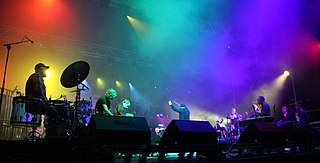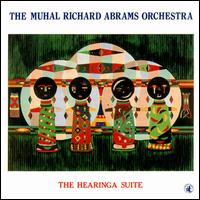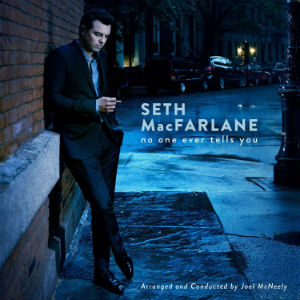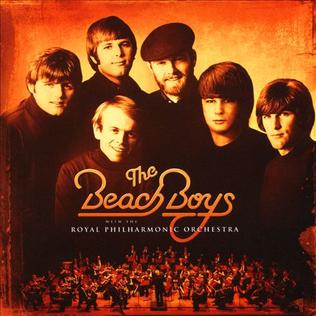Los Angeles jazz composer
Macchia has recorded a series of eclectic original projects featuring some of the best musicians in Los Angeles as well as European orchestras.
In 2003, he released The Galapagos Suite, a set of 6 pieces, each capturing his musical impression of one of the species that inhabit the Galapagos Islands. [4] The record features Macchia (woodwinds and synthesizers), Billy Childs (piano) Valarie King (flutes), Beverly Dahlke-Smith (bassoon) Grant Geissman (guitar), Alex Iles, Ken Kugler, and Bruce Fowler, (trombones). While this recording was generally received as a ‘new age’ project, Macchia had begun his exploration of unusual instrumental combinations, particularly low register brass and woodwind instruments.
In 2004, Macchia released Animals which continued to explore his interest in program music and leitmotif. Each piece is named after an animal (tigers, gorillas, camels, etc.). Specific instruments and thematic ideas are used to represent the personality of each animal; for example, the tuba plays the role of the hippo. The pieces cover a wide range of musical styles, from accessible modern jazz to evolving, complex Brazilian-influenced arrangements. Macchia blends complex polyrhythms and intricately layered ensemble passages with open solo sections, relaxed grooves, and splashes of musical humor. The ensemble, augmented by Wayne Bergeron (trumpet and flugelhorn), Scott Breadman (percussion), Dave Carpenter (bass), Stephanie Fife (cello), Mark Isham (trumpet), Tracy London (voice), and former Frank Zappa sideman Vinnie Colaiuta (drums), is well suited for the technical challenges of Macchia’s music.
Mo’ Animals was released in 2006, and in many ways is a continuation of Macchia’s 2004 release. The recording uses most of the same musicians with the notable addition of the virtuosic Howard Levy (best known as a founding member of Béla Fleck and the Flecktones) on harmonica.
In 2006, Macchia released Emotions, another highly programmatic project in which each piece is loosely inspired by a primary human emotion. The recording features Macchia performing with the Prague Orchestra conducted by Adam Klemens. This recording also revisits Macchia’s recurring interest in American folk music with arrangements of "Black Is the Color of My True Love's Hair" and "The Lonesome Road". "Black is the Color of My True Love’s Hair" was nominated in the Best Instrumental Arrangement category of the 50th Grammy Awards.
Macchia followed up Emotions with another Prague Orchestra collaboration in his 2007 release, Landscapes. [5] Michael G. Nastos, writing for AllMusic, compared this recording to Cityscapes, the 1982 collaboration between arranger Claus Ogerman and saxophonist Michael Brecker. [6] Macchia again mixes original compositions with explorations of traditional American Folk Music with arrangements of Shenandoah, Deep River and Down in the Valley, which was nominated in the Best Instrumental Arrangement category of the 51st Grammy Awards.
In 2008, Macchia released one of his most unusual recordings, Saxolollapalooza [7] features six saxophones and drums playing music in a wide variety of styles. The saxophones play all parts of the arrangements including the bass lines. The group consists of Eric Marienthal (Alto Sax, Soprano Sax, Flute), Sal Lozano (Alto Sax, Piccolo, Clarinet), Bob Sheppard (Tenor Sax, Clarinet, Flute), Frank Macchia (Tenor Sax, Bari Sax, Flute, Alto Flute, Clarinet, Contrabass Clarinet) Gene Cipriano (Bari Sax, Clarinet, Flute), Jay Mason (Bass Sax, Bass Clarinet), and Peter Erskine (Drums, Percussion). All but one piece are covers including Benny Goodman and Charlie Christian’s, "Air Mail Special", Michael Jackson's "Working Day and Night", Allen Toussaint’s "Java", (the trumpeter Al Hirt's hit), "Creole Love Call" by Duke Ellington, and "Work Song" by Nat Adderley. The record continues Macchia’s work with traditional American folk songs with arrangements of "Down by the Riverside", "Swing Low, Sweet Chariot", and "Shortening Bread".
In 2010, Macchia dove head first into his jazz treatments of traditional American folk songs with Folk Songs for Jazzers. This recording features fourteen tracks: "I've Been Working on the Railroad", "Red River Valley", "Skip to My Lou", "Oh! Susanna", "Did You Ever See a Lassie?", "Polly Wolly Doodle", "Tom Dooley", "The Arkansas Traveller", "Amazing Grace", "The Erie Canal", "Hush Little Baby", "The Blue Tail Fly", "Kumbaya", and "On Top of Old Smokey". The album features a big band of Los Angeles musicians: Wayne Bergeron (Flugelhorn, Trumpet), Peter Erskine (Drums), Ray Frisby (Percussion and Vibraphone), Grant Geissman (Banjo and Electric guitar), Ellis Hall (Vocal on Amazing Grace), Trey Henry (Acoustic and Electric Bass), Alex Iles (Baritone Horn, Trombone, Tuba), Valarie King (Bass Flute), Sal Lozano (Clarinet, Bass Clarinet, Flute, Bass Flute, Piccolo, Alto Saxophone), Frank Macchia (Clarinet, Alto Clarinet, Bass Clarinet, Contrabass Clarinet, Flute, Alto Flute, Bass Flute, Contrabass Flute, Piccolo, Tenor Sax), Jay Mason (Clarinet, Bass Clarinet, Flute, Bass Flute, English Horn, Piccolo, Baritone Saxophone, Bass Saxophone), Kevin Porter (Baritone Horn, Trombone, Bass Trombone, Tuba), Tom Ranier (Piano, Electric Piano), Bill Reichenbach (Baritone Horn, Trombone, Bass Trombone, Tuba), Bob Sheppard (Clarinet, Bass Clarinet, Flute, Alto Flute, Bass Flute, Piccolo, Soprano Saxophone, Tenor Saxophone), Tierney Sutton (vocal, Red River Valley).
In addition to the unique choice of material, this recording showcases Macchia’s interest in unusual instrumental combinations and the use of high and low register members of the brass and woodwind families not typically utilized in big band music.
Macchia’s arrangement of "Skip To My Lou" earned him his third Grammy nomination in the Best Instrumental Arrangement category of the 53rd Grammy Awards.
In 2011, Macchia released SON of Folk Songs For Jazzers, Chapter 2 of his 2010 big band project. This recording features the same musicians featured on the first release with the substitution of Michael Hatfield (Vibraphone, Marimba, Bass Marimba, Xylophone, Glockenspiel, Tambourine, Shaker) for Ray Frisby.
Son of Folk Songs for Jazzers features Macchia’s arrangements of "Twinkle, Twinkle, Little Star"; "Careless Love"; two versions of "Three Blind Mice"; "Itsy, Bitsy, Spider"; "Work Song Medley" ("Pick a Bale of Cotton"; "Shortnin’ Bread"); "Silver Dagger"; Medley: ("Cindy"; "Li’l Liza Jane"); "Frankie and Johnny"; "Billy Boy"; "This Old Man" (featuring a vocal performance by Macchia); and The Boating Medley ("Michael Row Your Boat Ashore"; "Row, Row, Row Your Boat").
In 2011, Macchia formed the electric six-piece band, Swamp Thang (Macchia composer, vocals, saxophones, and flutes, Ken Rosser and Eric Jensen electric guitars, John Rosenberg keyboards, Tommy Lockett electric bass, Frank Briggs drums). The group released two records, the self-titled Swamp Thang in 2012 and Fried Zombie Stew in 2013. "The versatile saxophonist takes a trip into a sonic landscape of bayou boogie, blues, funk, and New Orleans second-line with joyful and freewheeling attitude, letting the good times roll wild and crazy." [8] wrote All About Jazz critic Dan McClenaghan of the initial release. DownBeat magazine reviewer Michael Jackson gave Fried Zombie Stew three and a half stars. [9]
In late 2013, Macchia recorded a new large ensemble record for January 2014 release entitled Grease Mechanix, featuring Eric Marienthal, Brandon Fields, Bob Sheppard, Macchia, Sal Lozano, Jay Mason on reeds, Wayne Bergeron, Dan Fornero, Walt Fowler on trumpets, Alex Iles, Kevin Porter, Craig Gosnell on trombones, Bill Reichenbach on tuba, Ken Rosser on electric guitar, Peter Erskine on drums and Brad Dutz on percussion.
Macchia worked with drummer-percussionist Brock Avery to create Rhythm Kaleidoscope, which was released in November 2018. Brock created improvised drum solos that Macchia then took and composed music for, utilizing up to 40 woodwinds and added sampled orchestra in addition to guest soloists Stefanie Fife on cello, Alex Iles on trombone and Eric Jensen on electric guitar.
This has been followed up by another EP entitled Rhythm Abstraction:Azure along the lines of Rhythm Kaleidoscope where Brock created more improvised drum solos that Frank composed music to. This first of three EPs was released Jan 21, 2020 for digital downloads and streaming. The second EP, "Rhythm Abstraction: Gold" was released April 21, 2020. And the third and final installment of the trilogy, "Rhythm Abstraction: Ruby" was released for digital download and streaming on July 21, 2020.













